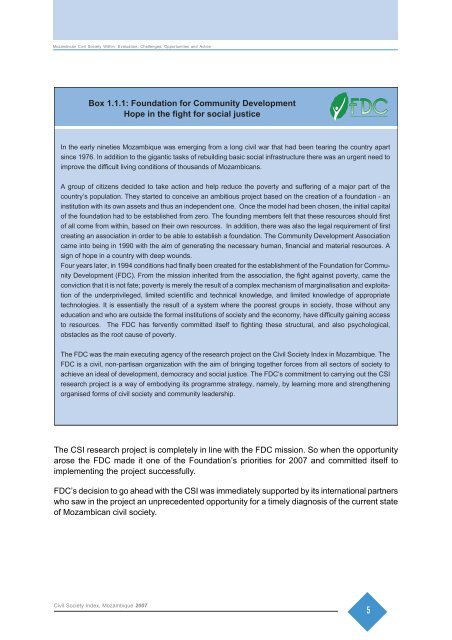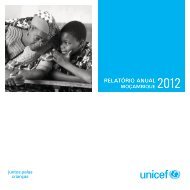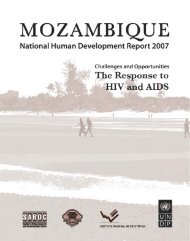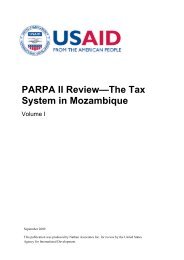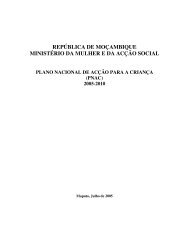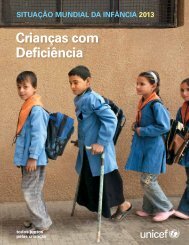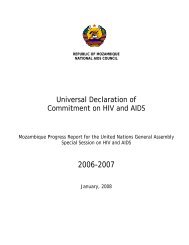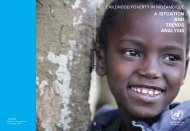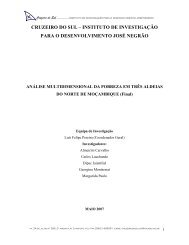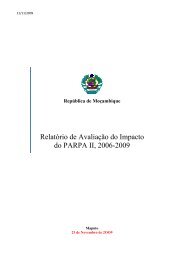Mozambican Civil Society Within: - UNICEF Mozambique - Home page
Mozambican Civil Society Within: - UNICEF Mozambique - Home page
Mozambican Civil Society Within: - UNICEF Mozambique - Home page
Create successful ePaper yourself
Turn your PDF publications into a flip-book with our unique Google optimized e-Paper software.
<strong>Mozambican</strong> <strong>Civil</strong> <strong>Society</strong> <strong>Within</strong>: Evaluation, Challenges, Opportunities and Action<br />
Box 1.1.1: Foundation for Community Development<br />
Hope in the fight for social justice<br />
In the early nineties <strong>Mozambique</strong> was emerging from a long civil war that had been tearing the country apart<br />
since 1976. In addition to the gigantic tasks of rebuilding basic social infrastructure there was an urgent need to<br />
improve the difficult living conditions of thousands of <strong>Mozambican</strong>s.<br />
A group of citizens decided to take action and help reduce the poverty and suffering of a major part of the<br />
country’s population. They started to conceive an ambitious project based on the creation of a foundation - an<br />
institution with its own assets and thus an independent one. Once the model had been chosen, the initial capital<br />
of the foundation had to be established from zero. The founding members felt that these resources should first<br />
of all come from within, based on their own resources. In addition, there was also the legal requirement of first<br />
creating an association in order to be able to establish a foundation. The Community Development Association<br />
came into being in 1990 with the aim of generating the necessary human, financial and material resources. A<br />
sign of hope in a country with deep wounds.<br />
Four years later, in 1994 conditions had finally been created for the establishment of the Foundation for Community<br />
Development (FDC). From the mission inherited from the association, the fight against poverty, came the<br />
conviction that it is not fate; poverty is merely the result of a complex mechanism of marginalisation and exploitation<br />
of the underprivileged, limited scientific and technical knowledge, and limited knowledge of appropriate<br />
technologies. It is essentially the result of a system where the poorest groups in society, those without any<br />
education and who are outside the formal institutions of society and the economy, have difficulty gaining access<br />
to resources. The FDC has fervently committed itself to fighting these structural, and also psychological,<br />
obstacles as the root cause of poverty.<br />
The FDC was the main executing agency of the research project on the <strong>Civil</strong> <strong>Society</strong> Index in <strong>Mozambique</strong>. The<br />
FDC is a civil, non-partisan organization with the aim of bringing together forces from all sectors of society to<br />
achieve an ideal of development, democracy and social justice. The FDC’s commitment to carrying out the CSI<br />
research project is a way of embodying its programme strategy, namely, by learning more and strengthening<br />
organised forms of civil society and community leadership.<br />
The CSI research project is completely in line with the FDC mission. So when the opportunity<br />
arose the FDC made it one of the Foundation’s priorities for 2007 and committed itself to<br />
implementing the project successfully.<br />
FDC’s decision to go ahead with the CSI was immediately supported by its international partners<br />
who saw in the project an unprecedented opportunity for a timely diagnosis of the current state<br />
of <strong>Mozambican</strong> civil society.<br />
<strong>Civil</strong> <strong>Society</strong> Index, <strong>Mozambique</strong> 2007<br />
5


